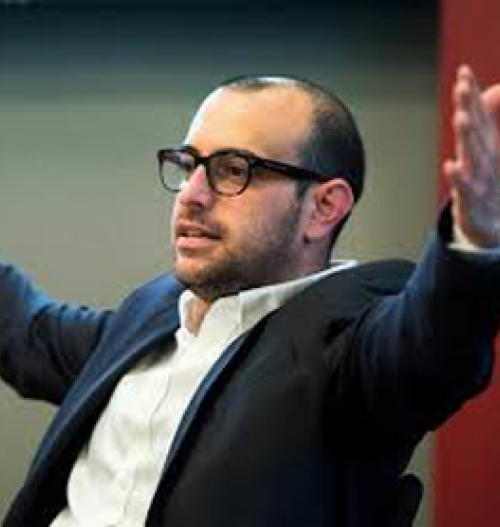
Research interests
Digital Diplomacy, Tech Geopolitics, and AI-driven Diplomacy
Corneliu Bjola
Corneliu Bjola (PhD, University of Toronto) is Professor of Digital Diplomacy at the University of Oxford and the Head of the Oxford Digital Diplomacy Research Group. His research focuses on the impact of digital technology on the conduct of diplomacy, with a special interest in public diplomacy, international negotiations, and methods for countering digital propaganda. Recently, he has been exploring the role of artificial intelligence in diplomacy, examining how AI can reshape key diplomatic functions, including international negotiations, crisis management, and public diplomacy. His work investigates how AI-driven tools can enhance decision-making, optimize negotiation strategies, and improve crisis response mechanisms, while also addressing the challenges AI poses, such as ethical concerns and the risk of algorithmic bias in diplomatic communications.
His most recent publications include The Oxford Handbook of Digital Diplomacy (Oxford University Press, 2024, co-ed.), which provides a comprehensive overview of the theory, practice, and future of digital diplomacy across different regions and issues. Another recent volume, Digital International Relations: Technology, Agency, and Order (Routledge, 2023, co-ed.), explores how digital disruption impacts world order and global governance. Additionally, he has authored or edited several academic books on digital diplomacy, including the twin volumes Countering Online Propaganda and Violent Extremism: The Dark Side of Digital Diplomacy (2018) – listed by BookAuthority among the 20 Best New International Relations Books to Read in 2019 – and Digital Diplomacy: Theory and Practice (2015). His co-edited volume Digital Diplomacy and International Organizations: Autonomy, Legitimacy, and Contestation (Routledge, 2020) examines the broader ramifications of digital technologies on the internal dynamics, multilateral policies, and strategic engagements of international organizations.
He has conducted training sessions for the Ministries of Foreign Affairs and Diplomatic Academies in U.K., European Union, Germany, Greece, Georgia, Spain, Israel, Lithuania, UAE, Saudi Arabia, Armenia, Honduras, Bahrain, Romania as well as for international organisations such as the UNITAR, the Digital Cooperation Organisation, United Nations System Staff College, the Commonwealth, the International Labour Organization, and the United Nations Population Fund.
Corneliu Bjola teaches on the Foundation Course on Global Governance and Diplomacy for the MSc in Global Governance and Diplomacy, as well as offering options on Diplomatic Management of International Crises and Diplomacy and International Law.
Doctoral supervision
Professor Bjola provides doctoral supervision on topics related to the impact of digital technology on the conduct of diplomacy with a focus on public diplomacy, diaspora engagement, crisis communication, as well as on theories and methods of digital strategic communication for countering disinformation and propaganda.
-
Books and monographs( ) The Oxford Handbook of Digital Diplomacy . , Oxford University Press( ) Digital International Relations: Technology, Agency and Order . , Routledge( ) Secret Diplomacy: Concepts, Contexts and Cases . , London: Routledge( ) Digital Diplomacy: Theory and Practice . , London and New York: Routledge( ) Understanding International Diplomacy: Theory, Practice and Ethics . , London and New York: Routledge( ) Arguing Global Governance: Agency, Lifeworld, and Shared Reasoning . , London and New York: Routledge( ) Legitimising the Use of Force in International Politics: Kosovo, Iraq and the Ethics of Intervention . , London and New York: Routledge
-
Journal articles and special issues( ) The Ukrainian meme machine: digital diplomacy and ‘quantum humour’ . European Journal of International Relations( ) Public diplomacy in the crossfire: decoding Ukraine's ‘Strategic Self’ during wartime . International Affairs 101 (6) 2059–2083( ) Studying Tech Diplomacy—Introduction to the Special Issue on Tech Diplomacy . Global Policy( ) Diplomacy as Stagecraft: Ambush, Performance, and the Ethics of the Trump–Zelenskyy Encounter . Ethics & International Affairs( ) Digital diplomacy in the age of technological acceleration: three impact scenarios of generative artificial intelligence . Place Branding and Public Diplomacy( ) The rise of hybrid diplomacy: from digital adaptation to digital adoption . International Affairs 98 (2) 471–91( ) Virtual Venues and International Negotiations: Lessons from the COVID-19 Pandemic . International Negotiation( ) Digital diplomacy as world disclosure: the case of the COVID-19 pandemic Place Branding and Public Diplomacy( ) AI for Development: Implications for Theory and Practice Oxford Development Studies( ) Tackling COVID-19 Disinformation: Internal and External Challenges for the European Union . The Hague Journal of Diplomacy 15 (4) 569–82( ) Digital propaganda, counterpublics and the disruption of the public sphere: the Finnish approach to building digital resilience . Cambridge Review of International Affairs( ) Public Diplomacy in the Digital Age . The Hague Journal of Diplomacy 14 (1) 83-101( ) Adapting Diplomacy to the Digital Age: Managing the Organisational Culture of Ministries of Foreign Affairs . Foreign Affairs Review (in Chinese) 1 1-27( ) Digital Diplomacy 2.0: Trends and Countertrends . Revista Mexicana de Política Exterior (in Spanish) 113 (July/August) 35-52( ) Revisiting Putnam’s Two-Level Game Theory in the Digital Age: Domestic Digital Diplomacy and the Iran Nuclear Deal . Cambridge Review of International Affairs 31 (1) 3-32( ) The Ethics of Countering Digital Propaganda . Ethics & International Affairs 32 (3) 305-15( ) Getting digital diplomacy right: What quantum theory can teach us about measuring impact? C Bjola (ed) Forum on 'Digital Diplomacy: State of the Art' Global Affairs 2 (3)( ) Digital Containment: Revisting Containment Strategy in the Digital Age . Global Affairs 2 (2)( ) Diplomacy as World Disclosure: A Fractal Theory of Crisis Management . British Journal of Politics and International Relations( ) How to use Momentum Analysis to Explain and Forecast the Outcome of International Negotiations? . International Negotiation 20 (2) 319-49( ) Negotiation Breakthrough Analysis: The Case of Climate Negotiations . International Negotiation 19 (1) 127-53( ) Diplomatic Leadership in Times of International Crisis: The Maverick, the Congregator and the Pragmatist . Hague Journal of Diplomacy 10 (1)( ) Understanding Enmity and Friendship in World Politics: The Case for a Diplomatic Approach . The Hague Journal of Diplomacy 8 (1) 1-20( ) The Ethics of Secret Diplomacy: A Contextual Approach . Journal of Global Ethics 10 (1) 85-100( ) Keeping the Arctic 'Cold': The Rise of Plurilateral Diplomacy? . Global Policy 4 (4) 347-58( ) Legitimacy and the Use of Force: Bridging the Legal-Moral Divide . Review of International Studies 34(4) 627-44( ) Understanding Dissonance in Security Communities: Germany and the United States on Iraq . Review of International Studies 33(2) 285-305( ) Legitimating the Use of Force in International Relations: A Communicative Action Perspective . European Journal of International Relations 11(2) 266-303
-
Chapters( ) The Use and Abuse of History by Russian Embassies on Twitter: The Case of the Baltic States . In Rubén Arcos, Irena Chiru and Cristina Ivan Routledge Handbook of Disinformation and National Security , Routledge( ) Diaspora Diplomacy in the Digital Age . In Liam Kennedy Routledge Handbook of Diaspora Diplomacy , Routledge( ) Digital Diplomacy In the Time of the Coronavirus Pandemic: Lessons And Recommendations. . In Paul W. Hare, Juan Luis Manfredi-Sánchez and Kenneth Weisbrode Handbook of Diplomatic Reform and Innovation , Palgrave Macmillan.( ) Digital propaganda as Symbolic Convergence: The case of the Russian ads during the 2016 U.S. presidential elections . In G Rawnsley, Y Ma and K Pothong Handbook of Political Propaganda , Edward Elgar( ) Coping with digital disinformation in multilateral contexts: The case of the UN Global Compact for Migration . In C Bjola, R Zaiotti Digital Diplomacy and International Organizations: Autonomy, Legitimacy and Contestation , Routledge( ) Digital Public Diplomacy. Business As Usual or Paradigm Shift? . In N Snow, N Cull Routledge Handbook of Public Diplomacy , Routledge( ) Propaganda as reflexive control: the digital dimension . In Corneliu Bjola, James Pamment Countering Online Propaganda and Extremism: The Dark Side of Digital Diplomacy , Routledge( ) Morality and Diplomacy . In Gordon Martel Encyclopedia of Diplomacy , Wiley-Blackwell( ) The Theory and Practice of Secret Diplomacy . In Corneliu Bjola & Stuart Murray Secret Diplomacy: Concepts, Contexts and Cases , London and New York: Routledge( ) Diplomatic Ethics . In C Constantinou, P Kerr and P Sharp SAGE Handbook of Diplomacy , SAGE( ) Digital Diplomacy as Change Management . In C Bjola, M Holmes Digital Diplomacy: Theory and Practice , London and New York: Routledge( ) Social Media and Public Diplomacy: A Comparative Analysis of the Digital Diplomatic Strategies of the EU, US and Japan in China . In C Bjola, M Holmes Digital Diplomacy: Theory and Practice , London and New York: Routledge( ) Global Governance . In D Rowe Achieving Sustainability: Visions, Principles, and Practices , New York: Macmillan Reference USA( ) The Power of the Public Sphere: (Anti)diplomacy and Crisis Management Within Security Communities . In C Bjola, M Kornprobst Arguing Global Governance: Agency, Lifeworld, and Shared Reasoning , London and New York: Routledge pp 194-209( ) Introduction: The Argumentative Deontology of Global Governance . In C Bjola, M Kornprobst Arguing Global Governance: Agency, Lifeworld, and Shared Reasoning , London and New York: Routledge pp 1-15( ) European Integration and the Politics of Commitment: The Case of Romania . In A Skuhra EU - Eastern Enlargement , Innsbruck: Studieverlag( ) Bringing Legitimacy Back in International Politics: The Use of Forced after the Cold War . In A Howell Governance and Global (Dis)orders: Trends Transformations and Impasses , Toronto: York Centre for International Security Studies( ) Collective Identity, Irony, and European Integration . In John Micgiel Democracy and Integration in an Enlarging Europe , New York: Institute for the Study of Europe at Columbia University
-
Working papers( ) Artificial Intelligence and Diplomatic Crisis Management: Addressing the ‘Fog of War’ Problem . DigDiploROx Working Paper No 6( ) The European Union’s Quest for Digital Sovereignty and its Implications for the Transatlantic Relationship . DigDiploROx Working Paper No 5( ) Combating Online Hate Speech and Anti-Semitism . DigDiploROx Working Paper No 4( ) Adapting Diplomacy to the Digital Age: Managing the Organisational Cultures of Ministries of Foreign Affairs . DigDiploROx Working Paper No 1





